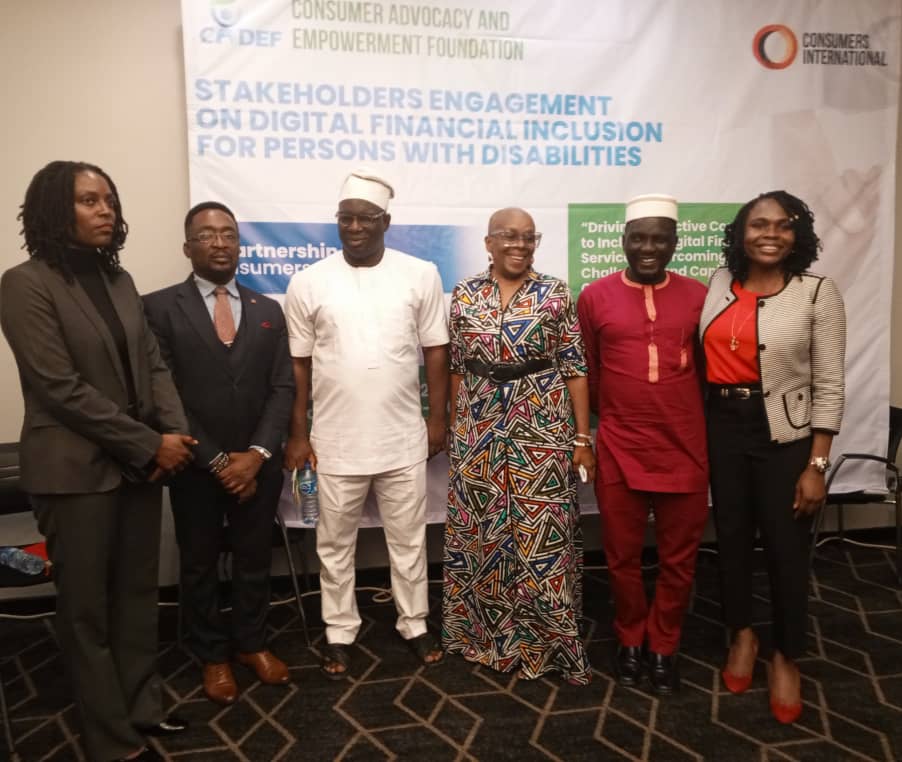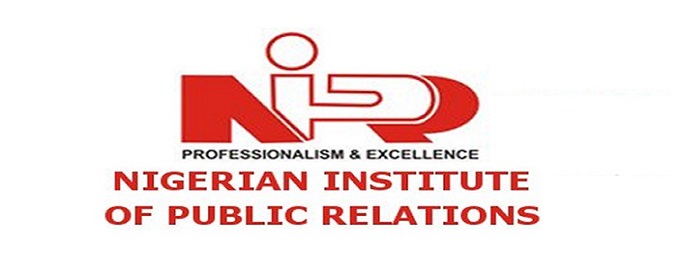Broadcasting
CADEF Promotes Financial Inclusion for Persons with Disabilities @One-day Workshop

Consumer Advocacy & Empowerment Foundation (CADEF) hosted a one-day workshop on “Improving Access and Inclusion for Persons with Disabilities (PWDs) in Digital Financing” in Lagos.

L-R: Bunmi Adebiyi, Senior Manger, Development Finance Office, CBN; Chinonso Umeh, Head, Retail Services ,Zenith Bank; Lukeman Salami, representative of Association for the Blind; Chiso Ndukwe-Okafor, Executive Director, CADEF; Adeola Aina, Vice-chairman, Association for the Blind and Lovelyn Okafor, Director of Programmes and Communications, CADEF at workshop on Improving Access and Inclusion for PWDs in Digital Financing in Lagos, recently.
The event brought together government officials, financial institutions, disability organizations, and experts to discuss strategies for enhancing financial inclusion for people with disabilities.
Speaking at the workshop, Safiu Babatunde, Head of Legal Services at the Lagos State Office for Disability Affairs, emphasized the importance of financial inclusion for people with disabilities.
He highlighted the challenges faced by individuals with disabilities in accessing traditional and digital financial services and called for innovative solutions to address these barriers.
“Disability related obstacles affect the participation of individuals at every stage of developmental interventions intended to boost livelihoods of people,” Babatunde said.
“Key among the resources essential for enhancing the livelihood of individuals is having access to financial resources for undertaking economic activities.”
He continued, “Unfortunately over the years, traditional banks do not seem to have served people with disability related obstacles.
“Persons with disability have limited access to financial services, including traditional and alternative banking, online payment services, and financial transactions as well as mobile banking applications.”
Babatunde emphasized the need for public-private partnerships to promote financial inclusion for people with disabilities.
“This partnership can bring together government agencies, financial institutions, and disability organizations to collaborate on developing and implementing initiatives that promote financial inclusion for these concerned populations,” he said.
Professor Chiso Ndukwe-Okafor, Executive Director of CADEF, underscored the organization’s commitment to advocating for the rights of marginalized groups.
She emphasized the need for inclusive financial products and services that cater to the specific needs of people with disabilities.
“CADEF has been empowering individuals with financial literacy, including those with disabilities.
“Our goal is to create inclusive financial systems that meet the needs of all Nigerians”, she said.
The Lagos State Office for Disability Affairs, LASODA, also called for increased public-private collaboration to address the financial barriers faced by PWDs.
General Manager of LASODA, Adenike Oyetunde-Lawal, emphasized the need for tailored financial products and accessible services.
Oyetunde-Lawal, who was represented by Mr. Safiu Babatunde, Head of the Legal Department, urged the banking sector to be more responsive to the needs of PWDs.
Participants discussed the challenges faced by people with disabilities in accessing financial services, such as limited awareness of available products, inaccessible ATMs and branches, and discriminatory practices.
They also explored potential solutions, including the development of accessible mobile banking applications, financial education programs in sign language and Braille, and partnerships with disability organizations.
At the conclusion of the workshop, participants agreed on the need for concerted efforts to improve financial inclusion for people with disabilities.
They pledged to work together to develop and implement practical solutions that will empower individuals with disabilities to participate fully in the financial sector.
Broadcasting
EFCC Arik Case: Witness Testifies on Receiver Manager Nominee’s Role in NG Eagle Shareholding


EFCC Arik
Broadcasting
NIPR Postpones Maiden PRICE Awards to January 25, 2026

Nigerian Institute of Public Relations (NIPR) has announced the postponement of its maiden annual Public Relations, Reputation, Ideas, Concepts and Excellence (PRICE) Awards and Prizes to January 25, 2026.

NIPR
The event, earlier scheduled for December 7, 2025, was deferred to accommodate stakeholders whose observance of Christmas festivities had commenced earlier than expected.
Chairman of the Organising Committee, Mr. Israel Opayemi, urged stakeholders to note the new date and prepare to participate in the ceremony.
He said the awards would motivate professionals, practitioners and scholars, while enhancing Nigeria’s global competitiveness in the public relations ecosystem and strengthening brand equity for all stakeholders.
Opayemi reaffirmed the Committee’s commitment to delivering a best-in-class award administration and ceremony, describing the PRICE Awards as a credible and enduring platform to identify, celebrate and elevate outstanding individuals, campaigns and organisations shaping the public relations landscape across sectors.
The development of the PRICE Awards peaked in September 2025 when the NIPR President and Chairman, Council, Dr. Ike Neliaku, inaugurated a 12-man committee to organise the maiden edition. The inauguration followed the Council’s adoption of the report of a technical team tasked with establishing the awards.
Broadcasting
Netflix Seals $82.7bn Deal to Acquire Warner Bros., HBO Max

Netflix has announced a landmark agreement to acquire Warner Bros. and HBO Max in a transaction valued at $82.7 billion, a move analysts say will reshape the global entertainment industry.

Netflix
The deal, which includes Warner Bros.’ film and television studios, HBO, HBO Max, and Warner Bros. Games, was unanimously approved by the boards of both companies. Under the terms, Warner Bros. Discovery (WBD) shareholders will receive $23.25 in cash and $4.50 in Netflix shares for each WBD share.
Netflix co-CEO Ted Sarandos described the acquisition as “a defining moment” for the streaming giant, noting that the company intends to maintain Warner Bros.’ current operations while expanding its production capacity.
“By combining Warner Bros.’ incredible library of shows and movies with Netflix’s culture-defining titles, we can give audiences more of what they love and help define the next century of storytelling,” Sarandos said.
The transaction is expected to close within 12 to 18 months, following the planned spin-off of WBD’s TV networks division, Discovery Global, in 2026. Netflix projects annual cost savings of $2–3 billion by the third year after completion and expects the deal to be accretive to earnings per share by year two.
Industry groups, including the Directors Guild of America and Cinema United, have raised concerns about the impact on movie theaters, while regulators are expected to scrutinize the deal over antitrust issues. Netflix has pledged to continue supporting theatrical releases, with Warner Bros.’ cinema commitments running through 2029.
Warner Bros. Discovery CEO David Zaslav hailed the agreement, saying it “combines two of the greatest storytelling companies in the world to bring to even more people the entertainment they love.”
Observers note that the acquisition comes 15 years after former Time Warner chief Jeff Bewkes dismissed Netflix as “the Albanian army,” underscoring the dramatic shift in the entertainment landscape.

 Telecom1 day ago
Telecom1 day agoNigeria Lacks AI-Ready Data Centres, Trails in Capacity – Nnamani

 E-Financial1 day ago
E-Financial1 day agoCAC to Shut Down Unregistered PoS Operators by January 2026

 General News1 day ago
General News1 day agoNiDCOM Launches Diaspora Startup Challenge to Boost Nigerian Talent

 Telecom1 day ago
Telecom1 day agoAnambra Leads Southeast in Digital Governance Under Soludo’s ICT Agenda

 General News1 day ago
General News1 day agoOptimus AI LABS CEO Showcases AI Breakthroughs in Nigeria’s Financial Sector

 News1 day ago
News1 day agoLagos Launches Tele-Vet, Nigeria’s First Veterinary Call Centre

 General News1 day ago
General News1 day agoPromoPrint Rekindles Nigerian Resilience @ 25th Anniversary

 Telecom10 hours ago
Telecom10 hours agoNigeria Dominates 2025 TikTok Sub-Saharan Africa Awards with Six Wins
























